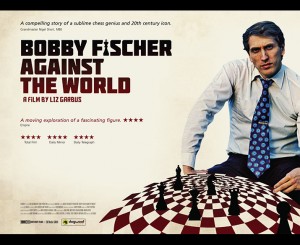Hignose movie review #2
Got bored, so dug through my stash and reacquainted myself with a fascinating documentary about a man that fought the Cold War single-handedly in a world of black and white:
This 2011 HBO documentary is very well done, and covers everything from his early childhood to the aftermath of his death. Bobby Fischer was an obsessive genius at chess, National Champion just before turning 15, and at 29 winning the 1972 World Championship virtually alone against the USSR’s proud chess-culture tradition. Shortly thereafter, he disappeared from the public, forfeiting his title in 1975 by refusing to play (but claiming he was unbeaten, so still the title-holder). Nearly 20 years later, he came back out of the blue, announcing a World Championship rematch against his 1972 opponent Boris Spassky to be held in Yugoslavia. When threatened by the Dept of the US Treasury that such an event would defy UN sanctions and an executive order from George H.W. Bush, he publicly spat on the order in front of the media. Now a fugitive (for playing chess!) he floated around Budapest, Hungary and kept a low profile for most of the ’90s, moved to the Philippines in 2000, and Japan around 2003. Arrested on order of the US (for traveling on a revoked passport) by Japanese immigration authorities when trying to return to the Philippines, he was granted asylum and citizenship by Iceland, where he had played the championship in 1972. He lived there until his death from kidney failure (he had refused treatment) in 2008, leaving behind a financial mess with 4 claimants on his $2 million estate (His apparent Japanese wife, his alleged Philippino daughter and her mother, 2 american nephews, and the US government).
The film starts with early appearances of Fischer, showing him on an episode of “I’ve Got A Secret” as well as playing 20 games simultaneously in an exhibition. It then moves for the bulk of the running time to the preparation for the 1972 match, interviewing the olympic trainer he hired to get him physically fit, and an analysis of the 21-game match itself. (It’s bizarre to see someone train in racquetball, swimming, weightlifting, and even a grip builder and underwater breath training for a chess match, but things were taken this seriously. He even received a call from Kissinger urging him to see things through, and a current Kissinger interview appears in the film.) Recollections and opinions of contemporary and current chess masters are scattered throughout the film, even Boris Spassky himself. We then go to Fischer’s near disappearance, and start to mention his strange rants, conspiracy theories, and emerging anti-semitism, which seem to become more paranoid over time. The last segments cover the lackluster 1992 rematch and fallout chasing him until his death, as well as his now-bizarre behavior and rhetoric. (After seeing the long memory of the US gov’t in “The US vs. John Lennon”, I can only wonder if Fischer was not entirely baseless in some of his paranoia.)
All in all, it is a gripping narrative on one of the strangest and most reclusive personalities of the 20th century, someone who arguably peaked at 30 and started a US chess boom in the 1970’s, revolutionizing the game along the way. (I’m glad I learned to play chess in school in 1977 at age 6, and do not think that would have happened without Bobby Fischer.) Interviews and archive footage are very well-chosen in this film, I was delighted to find a clip from the Dick Cavett Show which included Tony Randall poignantly asking Fischer “You’ve hit the pinnacle so early, what do you do now?”. Chess legends Boris Spassky and Gary Kasparov gave current interviews, while Anatoli Karpov and Mikhail Tal appear in archive footage. Fischer is covered from many angles, as a child genius, a sheltered outcast, a jerk, a paranoid-schizophrenic, an innovator….. but it never quite pins him down. Sadly, it does leave the impression that events worked against flaws in his mind and left him eight kinds of crazy by the end. Definitely a good watch, even if you don’t know much about chess.


June 24th, 2014 at 11:39 pm
Thanks for the tip, I was very much into chess for a while and reviewed some of his classic games.
June 24th, 2014 at 11:42 pm
For you HBO subscribers, this is available on demand via HBO GO now.
June 25th, 2014 at 8:04 pm
Thanks, TTop. Will check it out on HBO Go. Sounds like some more of J. Edgar’s shenanigans.
June 26th, 2014 at 4:14 pm
Definitely Hoover’s style, but I think it’s telling that while Fischer spat on the order from Bush Sr.’s administration, it was Dubya that had him picked up on the illegal immigration charge. Another example of tying up daddy’s loose ends?
One great Cold War era accusation was leveled after game 3 with Spassky, when the Russians had the room closely examined for CIA devices after Spassky felt he had been affected by some kind of radiation or electronic projection.
In the DVD extras there is a short featurette about Fischer’s alleged Filipino daughter (Spoiler: exhumation DNA test 2 years later concluded she wasn’t), as well as a brief history of chess and examination of a few of the great players that went nuts. I’d love to know one thing that’s not answered, and that’s the final settling of Fischer’s estate and whether Uncle Sam grabbed most of it. As I think most people know, our gov’t will spend 20 years and $20 million to grab $2 million from someone just to make a point, if you get them butt-hurt enough.
June 26th, 2014 at 9:23 pm
I think one of Dubs major faults was seeking his father’s approval, stemming from parental neglect during his childhood. Explains several strange occurrences during his tenure.